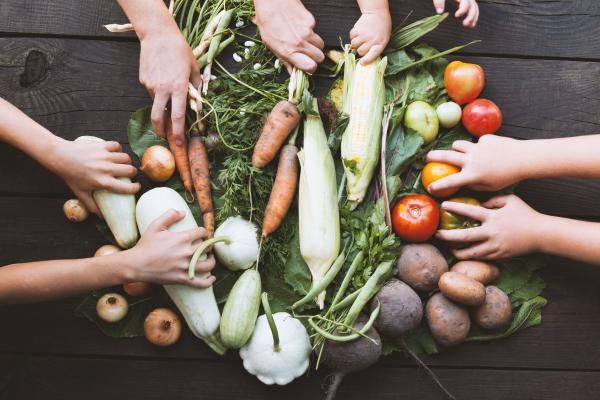Farm & Food Certifications
Animal Welfare Approved
Animal Welfare Approved (AWA) is a food label for meat and dairy products that come from farm animals raised to the highest animal welfare and enviorment standards. AWA sets standards that farmers must follow before they can sell their meat, eggs, and dairy products as AWA. The standards set forth by AWA ensure that every certified farm provides their animals with continual access to pasture or range, as well as the opportunity to perform natural and instinctive behaviors essential to their health and well-being. animalwelfareapproved.org
Certified Biodynamic
Biodynamic farm systems emphasize biodiversity organized in such a way that the waste of one part of the farm becomes the energy for another. This results in an increase in the farm’s capacity for self-renewal and ultimately makes the farm sustainable. Biodynamic farming is free of synthetic pesticides and fertilizers in a similar manner to organic farming. Farms wishing to become Certified Biodynamic must meet the additional requirements of biodynamic farming standards. www.demeter-usa.org/for-farmers/certification.asp
Certified Humane
Certified Humane labels indicate that the food products have come from facilities that meet precise, objective standards for farm animal treatment from birth through slaughter. Certified Humane indicates that there is no use of cages, crates or tie stalls and animals are fed a diet of quality feed, without animal by-products, antibiotics or growth hormones. certifiedhumane.org
Certified Naturally Grown
Certified Naturally Grown (CNG) is a grassroots alternative to the NOP and is tailored for direct-market farms selling within their local communities. Farmers who are CNG practice a full commitment to robust organic practices and do not use synthetic herbicides, pesticides, fertilizers, antibiotics, hormones, or genetically modified organisms. CNG relies on a transparent certification process in which inspections are typically carried out by other farmers. This model promotes farmer-to-farmer knowledge sharing about best practices and fosters local networks that strengthen the farming community. www.cngfarming.org
Certified Organic
The USDA’s National Organic Program (NOP) requires anyone who produces, processes, or handles organic agricultural products to be certified by an accredited program in order to sell, label or represent their products as organic. New York’s certifying entity is the Northeast Organic Farming Association of New York (NOFA-NY). Farms and producers must demonstrate NOP approved organic methods that integrate cultural, biological, and mechanical practices that foster cycling of resources, promote ecological balance, and conserve biodiversity. Certified organic farms and producers endure a rigorous application process that includes on-site inspection, water and soil testing, proof of organic seed purchase and the disclosure of a detailed organic system plan. www.nofany.org
Eco Apple
Developed by Red Tomato, a food distribution nonprofit, Eco Apple is a rigorous ecology-based farming and certification program that supports and rewards farmers who use the most eco-sensitive, minimally treated, natural methods possible to grow their fruit. Eco growers use growing practices that promote soil and tree health, nurture pollinators, and protect biodiversity. Orchards are certified by the IPM Institute of North America. Eco Fruit - Red Tomato
Farmers Pledge
Established by NOFA-NY, the Farmer’s Pledge is a separate and distinct program from the NOP and is based on the integrity of the farmer. The pledge seeks to describe sustainable and organic practices in a document that growers can attest is an accurate description of how they farm. www.nofany.org
Food Alliance Certified
Food Alliance is an organization that certifies agricultural operations, food processors, and distributors who practice sustainability in food and farming. Food Alliance certifies operations that focus on biodiversity, energy conservation, safe and fair working conditions and other social and environmentally sound business practices. Certifications are offered for crops, livestock, farmed shellfish, nursery and greenhouse operations and food handling. foodalliance.org/certification
GAP Certified
Good Agricultural Practices (GAP) and Good Handling Practices (GHP) are voluntary audits that focus on best agricultural practices to verify that fruits and vegetables are produced, packed, handled, and stored in the safest manner possible to minimize risks of microbial food safety hazards. www.ams.usda.gov/services/auditing/gap-ghp
IPM Methods
Integrated Pest Management (IPM) is an approach to managing pests such as insects, diseases and weeds using a variety of methods. These include cultural control, biological control, mechanical control and chemical control. IPM practitioners in agriculture learn pest biology and use that knowledge to reduce pest control costs and hazards through crop rotation, reintroduction of natural, disease-fighting microbes, and the release of beneficial organisms that prey on pests. www.ipminstitute.org
Pride of NY
The Pride of NY program is the state’s branding program for the promotion of agricultural products grown, produced or processed in NYS. The program markets participants and informs consumers about the availability and variety of NY-produced products. taste.ny.gov
Raw Milk Sales Permit
To sell raw cow milk in New York State directly from the farm to consumers, a producer is required to obtain a Raw Milk Part 2 permit. The permit indicates that the producer has met the requirements set forth by the New York State Department of Agriculture and Markets. www.agriculture.ny.gov/DI/DIFAQ.html
